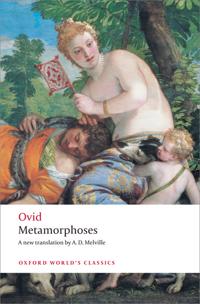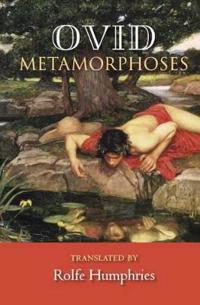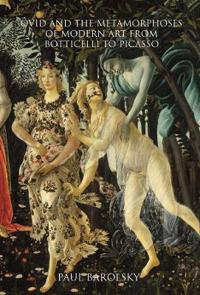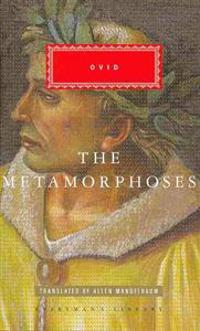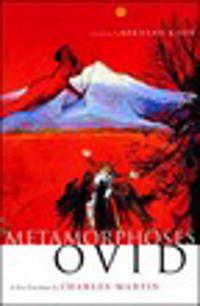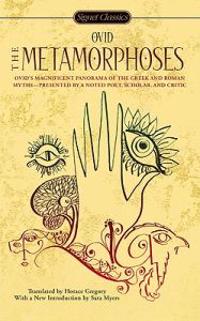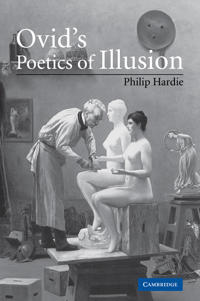"Amores", "Medicamina Faciei Femineae", "Ars Amatoria", "Remedia Amoris" (Inbunden)
avOvid
ISBN: 9780198149699 - UTGIVEN: 199408Since it first appeared in 1961 this has been the standard critical edition of Ovid's love poems. For this new edition the text has been throughly revised to take account of published scholarship and the further thoughts of the editor. Conjectures have been admitted to both text and apparatus critic[...]
Ovid's Changing Worlds: English Metamorphoses 1567-1632 (Inbunden)
avRaphael Lyne
ISBN: 9780198187042 - UTGIVEN: 2001-10-18Milton and the Metamorphosis of Ovid (Pocket)
avMaggie Kilgour
ISBN: 9780198717126 - UTGIVEN: 2014-08Milton and the Metamorphosis of Ovid contributes to our understanding of the Roman poet Ovid, the Renaissance writer Milton, and more broadly the transmission and transformation of classical traditions through history. It examines the ways in which Milton drew on Ovid's oeuvre, as well as the long t[...]
Ovid's Presence in Contemporary Women's Writing
ISBN: 9780198779889 - UTGIVEN: 2018-10This innovative study analyses the presence of Ovid in contemporary women's writing through a series of insightful case studies of prominent female authors, from Ali Smith, Marina Warner, and Marie Darrieussecq, to Alice Oswald, Saviana Stanescu, and Yoko Tawada. Using Ovid in their engagements with[...]
The Lives of Ovid in Seventeenth-Century French Culture
ISBN: 9780198796770 - UTGIVEN: 2017-05Seventeenth-century France saw one of the most significant 'culture wars' Europe has ever known. Culminating in the Quarrel of the Ancients and Moderns, this was a confrontational, transitional time for the reception of the classics. Helena Taylor explores responses to the life of the ancient Roman [...]
Poetics of Latin Didactic, The: Lucretius, Vergil, Ovid, Manilius (Inbunden)
avKatharina Volk
ISBN: 9780199245505 - UTGIVEN: 2002-06-27Metamorphoses (Pocket)
avOvid, E. J. Kenney, A. D. Melville
ISBN: 9780199537372 - UTGIVEN: 200904The theme of the Metamorphoses is change and transformation, as illustrated in Graeco-Roman myth and legend. On this ostensibly unifying thread Ovid strings together a vast and kaleidoscopic sequence of brilliant narratives, in which the often paradoxical and always arbitrary fates of his human and[...]
The Love Poems (Pocket)
avOvid
ISBN: 9780199540334 - UTGIVEN: 2008-05-08The elegant verse and subtle observation of the Amores, The Art of Love, and The Cures of Love made their author the talk of Rome. Ovid saw love as a game at which both sexes could play without getting hurt - as long as they stuck to his rules, but primarily he wrote these sparkling and often erotic[...]
Commentary on Ovid's Fasti, A: Book 2 (Inbunden)
avMatthew Robinson
ISBN: 9780199589395 - UTGIVEN: 2010-11-25Serious Play: Desire and Authority in the Poetry of Ovid, Chaucer, and Ariosto (Inbunden)
avRobert W. Hanning
ISBN: 9780231152105 - UTGIVEN: 2010-08-31Metamorphoses (Häftad)
avRolfe Humphries, Ovid
ISBN: 9780253200013 - UTGIVEN: 195506The first and still the best modern verse translation of the "Metamorphoses", Humphries' version of Ovid's masterpiece captures its wit, merriment, and sophistication. Everyone will enjoy this first modern translation by an American poet of Ovid's great work, the major treasury of classical mytholog[...]
Ovid (häftad)
ISBN: 9780300042955 - UTGIVEN: 1988-07Ovid (Publius Ovidius Naso, 43BC-16AD) was a Roman poet, author of "Amores," "Heroides," "Ars Amatoria," and "Metamorphoses." A historical, biographical, and literary study of his poetry and influence. Hermes series on classical authors.[...]
Ovid and the Metamorphoses of Modern Art From Botticelli to Picasso (Inbunden)
avPaul Barolsky
ISBN: 9780300196696 - UTGIVEN: 2014-10Written in the spirit of Ovid (43 B.C--A.D. 17/18), this lively and erudite book traces the art derived from Ovid's Metamorphoses from the Renaissance up to the present day. The Metamorphoses has been more widely illustrated than any other book except the Bible; for centuries, great artists have dra[...]
After Ovid: New Metamorphoses (Häftad)
avMichael Hofmann, James Lasdun, Michael Hofmann
ISBN: 9780374524784 - UTGIVEN: 1996-04The Metamorphoses (Inbunden)
avOvid, J. C. McKeown
ISBN: 9780375712319 - UTGIVEN: 2013-09Ovid's famous mock epic--a treasury of myth and magic that is one of the greatest literary works of classical antiquity--is rendered into fluidly poetic English by world-renowned translator Allen Mandelbaum.
Roman poet Ovid's dazzling cycle of tales begins with the creation of the world and end[...]Metamorphoses (Inbunden)
avOvid
ISBN: 9780393058109 - UTGIVEN: 2003-12A new translation of the epic Roman poem on the dynamics of change seeks to remain faithful to the author's original text and reflects Ovid's themes of speed and liveliness.[...]
Metamorphoses (Häftad)
avOvid
ISBN: 9780393326420 - UTGIVEN: 2005-03A new translation of the epic Roman poem on the dynamics of change seeks to remain faithful to the author's original text and reflects Ovid's themes and the poet's original speed and liveliness. Reprint.[...]
The Metamorphoses (Pocket)
avOvid, Sara Myers
ISBN: 9780451531452 - UTGIVEN: 200911A masterpiece of Western culture, this is the first attempt to link all the Greek myths in a cohesive whole to the Roman myths of Ovid's day. Horace Gregory, in this modern translation, turns his own poetic gifts toward a deft reconstruction of Ovid's ancient themes.
[...]Eshbach's Handbook of Engineering Fundamentals (Inbunden)
avOvid W. Eshbach, Myer Kutz
ISBN: 9780470085783 - UTGIVEN: 200901With specialization now the norm in engineering, students preparing for the FE and PE exams and practitioners going outside their specialty need a general reference with material across a number of disciplines. Since 1936, Eshbach's Handbook of Engineering Fundamentals has been the bestselling refer[...]
The Art of Love (Pocket)
avOvid, Stanley (TRN) Appelbaum, Jean (ILT) De Bosschere
ISBN: 9780486476605 - UTGIVEN: 2010-12Poems of Exile, The: Tristia and the Black Sea Letters (Övrig)
avOvid
ISBN: 9780520242609 - UTGIVEN: 2005-01-18In the year A.D. 8, Emperor Augustus sentenced the elegant, brilliant, and sophisticated Roman poet Ovid to exile - permanently, as it turned out - at Tomis, modern Constantza, on the Romanian coast of the Black Sea. The real reason for the emperor's action has never come to light, and all of Ovid's[...]
Ovid's Poetics of Illusion
ISBN: 9780521030922 - UTGIVEN: 2007-01Ovid's poetry is haunted obsessively by a sense both of the living fullness of the texts and of the emptiness of these 'insubstantial pageants'. This major study touches on the whole of Ovid's output, from the Amores to the exile poetry, and is an overarching treatment of illusionism and the textual[...]


